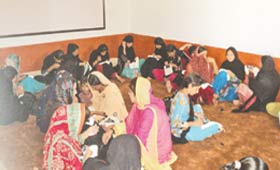women
Sindh is famous for fabric, ajraks, pottery, coarse cotton cloth (soosi), camel fitting, lacquer work, cotton lunges and khes, earth ware, metal vessels and the rally quilt. Though women in Sindh are naturally good artisans, they need proper training in order to sell their goods in the market. There are various vocational centres in Sindh that provide technical training to rural women so that they can improve their skills and learn modern ways to earn their livelihood. The centres running by different organizations are a ray of hope for young girls and women to do something for their families. This week You! features one such centre in Bhitshah Town, Matiari district. This centre provides necessary traning to rural women in a bid to equip them with demands of the market.
Amongst those women is Shahida Arain, who belongs to a low-income family residing in Bhitshah town, who has enrolled herself in a learning centre in Bhitshah Town, Matiari district.
This centre which is run by a number of organisations, has enrolled 75 women to train and create a better source of earning. According to Shahida, “It was quite unexpected. When somebody told me about this private learning centre, I came to test my luck and got enrolled free of cost. Since then I have been going there regularly. All that is required of me is to follow the guidelines of the lady instructor, who teaches all the latest techniques.”
Shahida works from 9 am to 1 pm daily in the centre where the art of making handicrafts with fabric is taught. “After spending four hours here, I practice what I have learnt at home to prepare items to sell,” says Shahida.
Like Shahida, women who are enrolled at the centre are taught to use fabric and colourful threads to produce smaller things like mobile pouch, key-chains, table runners, decorative items etc, which otherwise are not available in the town. Amongst the many products that are created at the centre are items for room decoration, beautiful key-chains with colourful fabric and threads, etc.
Women @ the training centre in Bhitshah
Khairun Nisa is another woman who has a similar story. She lives independently with her son and visits the learning centre daily in order to learn the art of creating crafts that she can sell in order to meet her needs. Through the centre she has learnt different skills like preparing and cutting rally, stitching clothes and doing hand embroidery.
According to Nisa, the market now has more demand for items like mobile pouch, hand pouch, key chains etc. “I mostly do embroidery work but it takes more time to prepare one item and in return I get a less amount of money,” shares Nisa.
Jado Leghari, a trainer at the centre, is an artisan and a mother of five. Leghari belongs to Johi, Dadu district and travels a long distance to teach these inexperienced young women so they may have better source of earning. She is a graduate and has learnt the skills of arts and crafts from her mother and grandmother.
Leghari has visited villages and cultural places like LokVirsa, Islamabad and has taken part in exhibitions in Karachi and other cities where she has displayed her work and received appreciation certificates. “This artisan work has always interested me as threads hold different meaning for me. It took me a long time to learn variety of items. But soon enough, I mastered the art and was being appreciated for my work by leading institutions. And then I began working on promoting these cultural items for manufacturing,” she informs.
She accredits her experience and success to Participatory Research and Development Organization (Prado), which is running a centre in collaboration with USAID. “My first major boost was when I displayed the products at Bhitshah and attracted a large number of people,” she shares.
“I am hopeful that after some time these women who are coming to the centre to learn handicrafts will make a name for themselves through their talent and produce valuable items for the market,” says the trainer.
Without a doubt, such centres are a ray of hope for young girls and women who want to do bring about a change and live better lives.